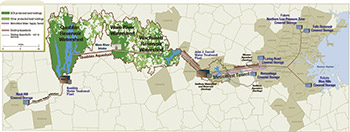| Home |
| About MWRA |
| Water System |
| Sewer System |
| Harbor and Bay |
| School Program |
| Doing Business with MWRA |
| Contact MWRA |
Integrated Water Supply Improvement Program
Massachusetts Water Resources Authority
A STRONGER, SAFER WATER SYSTEM
MWRA’s Integrated Water Supply Improvement program is a 10-year, $1.7 billion series of projects to protect watersheds, and to build new water treatment and transmission facilities.
|
MAIN COMPONENTS OF THE PROGRAM
Watershed Protection Programs
Watershed protection and management are the foundations of good water quality. 75% of the Quabbin, Ware River and Wachusett watersheds are DCR-owned and protected open space or regulated by the Watershed Protection Act. Programs are in place to purchase an additional 1,500 acres per year, build sewer systems to eliminate poor septic systems near critical tributaries, and keep birds and other wildlife away from intake areas.
more information
Disinfection Improvements
MWRA meets EPA’s “CT” requirements to control bacteria and giardia. Water chemistry adjustments have also resulted in lower lead levels caused by old, corroded household pipes. The William A. Brutsch Water Treatment Facility was opened in 2000 to provide effective disinfection for the Chicopee Valley Aqueduct system.
John J. Carroll Water Treatment Plant
This facility treats up to 405 million gallons of water from the Wachusett Reservoir each day, using ozone and ultraviolet light (UV) as primary disinfectants and chloramines for residual disinfection. This treatment allows MWRA to meet current and tougher future state and federal water quality standards. The plant came on-line in July, 2005.
more information
MetroWest Water Supply Tunnel
This 17.6-mile long, deep-rock tunnel enhances the security, capacity and reliability of MWRA’s entire water transmission system. The MetroWest Water Supply Tunnel connects the new Carroll Treatment Plant to the greater Boston area. This will become the main transmission line, with the Hultman Aqueduct serving as the back-up. It went on-line in 2003.
more information
Water Storage Tanks - We have recently built four covered storage tanks to replace small open reservoirs near cities and towns. This lessens the risk that contaminants will get into your tap water and is required by the State Department of Environmental Protection (DEP) rules. Tanks in Stoneham (Fells), Ludlow (Nash Hill), Weston (Loring Road and Norumbega) and in the Blue Hills (Quincy) are now complete. An additional tank in the Northern Low Pressure Zone, are planned.
more information
Pipeline Rehabilitation
Over 2,000 miles (about 33%) of locally-owned water mains are old, corroding iron pipes in need of rehabilitation. MWRA’s Local Pipeline and Water System Assistance Program provides $466 million in zero-interest loans to communities for relining or replacing local pipes. MWRA also has an aggressive program to rehabilitate its own 300-mile distribution network of larger pipes leading to the community systems, improving water quality and systems reliability.
more information
Updated August 23, 2022
